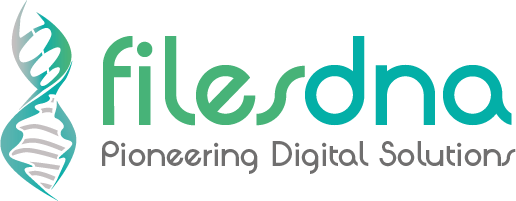Banks

Transforming Banking with FilesDNA
The banking sector is a linchpin of the global economy, characterized by its vast operational scope and rigorous regulatory landscape. Banks continuously seek innovative solutions to enhance efficiency, security, and customer satisfaction. This article explores how FilesDNA, through its suite of features including document management system, e-signature, electronic signature, electronic forms, smart survey system, file management system, and automation, is revolutionizing the banking industry.
Document Management System
Banks handle a plethora of documents daily, ranging from customer applications to financial statements. FilesDNA’s document management system enables banks to securely store, organize, and retrieve these documents effortlessly, ensuring a streamlined workflow.
E-Signature and Electronic Signature
The traditional pen-and-paper signing process is not only time-consuming but also cumbersome. With FilesDNA’s e-signature and electronic signature solutions, banks can facilitate secure online signing, making processes like account opening and loan approvals faster and more convenient.
Electronic Forms
Paper forms are prone to errors and delays. FilesDNA’s electronic forms enable banks to create and process forms digitally, enhancing accuracy and reducing processing time.
Smart Survey System
Customer feedback is essential for continuous improvement. FilesDNA’s smart survey system allows banks to design and conduct surveys that gather insightful customer feedback and preferences, helping banks tailor their services accordingly.
File Management System
A systematic file management system is critical in banking, given the vast volume of documents handled. FilesDNA provides a solution that ensures that files are organized and easily accessible, enhancing productivity.
Automation
FilesDNA’s automation features enable banks to automate various repetitive tasks, such as notifications, reminders, and follow-ups. This leads to increased efficiency and allows employees to focus on more critical tasks.
How FilesDNA Addresses Challenges in Banking
1. Enhancing Customer Experience
FilesDNA offers solutions like electronic forms and e-signature that make banking more accessible and convenient for customers, thereby enhancing their overall experience.
2. Ensuring Compliance
Regulatory compliance is paramount in banking. FilesDNA’s document and file management systems ensure that all documents are handled in accordance with legal requirements, minimizing the risk of non-compliance.
3. Improving Efficiency
With automation and smart survey systems, FilesDNA helps banks streamline their operations. This not only leads to better resource utilization but also enhances overall efficiency.
4. Ensuring Data Security
FilesDNA prioritizes data security. Whether it’s personal or financial data, all information is stored and transmitted securely, maintaining the integrity and confidentiality of the data.
Conclusion
FilesDNA’s robust solutions, including document management system, e-signature, electronic signature, electronic forms, smart survey system, file management system, and automation, present an unparalleled opportunity for the banking sector to transform its operations.
By leveraging FilesDNA, banks can offer superior customer service, ensure compliance, increase efficiency, and safeguard sensitive information. The adoption of FilesDNA not only signifies an alignment with contemporary technological advancements but also a commitment to excellence, innovation, and customer-centricity.
Visit filesdna.com to explore how FilesDNA can redefine your banking business, leading the way in digital transformation and setting new benchmarks in the industry.
Frequently Asked Questions (FAQs)
Q1: How does FilesDNA’s document management system aid in banking operations? A: FilesDNA’s document management system enables banks to securely manage and access all banking-related documents, accelerating processing time, and ensuring compliance with legal regulations.
Q2: Can FilesDNA’s e-signature be used for signing banking documents? A: Yes, FilesDNA’s e-signature and electronic signature solutions are legally compliant and can be used to securely sign various banking documents such as loan agreements and account opening forms.
Q3: How does FilesDNA’s smart survey system benefit banks? A: FilesDNA’s smart survey system helps banks assess customer satisfaction, preferences, and needs. This information is vital in shaping banking products and services, leading to better customer retention and acquisition.
Q4: How does FilesDNA’s file management system contribute to banking efficiency? A: FilesDNA’s file management system organizes and retrieves various documents efficiently, cutting down time spent on searching for files and improving collaboration among bank employees.
Q5: How can FilesDNA’s electronic forms streamline banking applications? A: FilesDNA’s electronic forms enable customers to fill and submit applications online, reducing errors and accelerating processing time, making banking services more user-friendly.
Q6: What security measures does FilesDNA implement for banking data? A: FilesDNA employs robust security measures like encryption, authentication, and access controls to ensure the highest protection of sensitive banking information.
Q7: How can FilesDNA’s automation feature assist in banking workflows? A: FilesDNA’s automation tools can automate routine tasks like reminders for account renewals or payment notifications, enhancing efficiency and customer engagement.
Q8: How does FilesDNA integrate with existing systems within a bank? A: FilesDNA is designed to seamlessly integrate with existing banking IT infrastructure, ensuring smooth transition and synergy across various functions.




